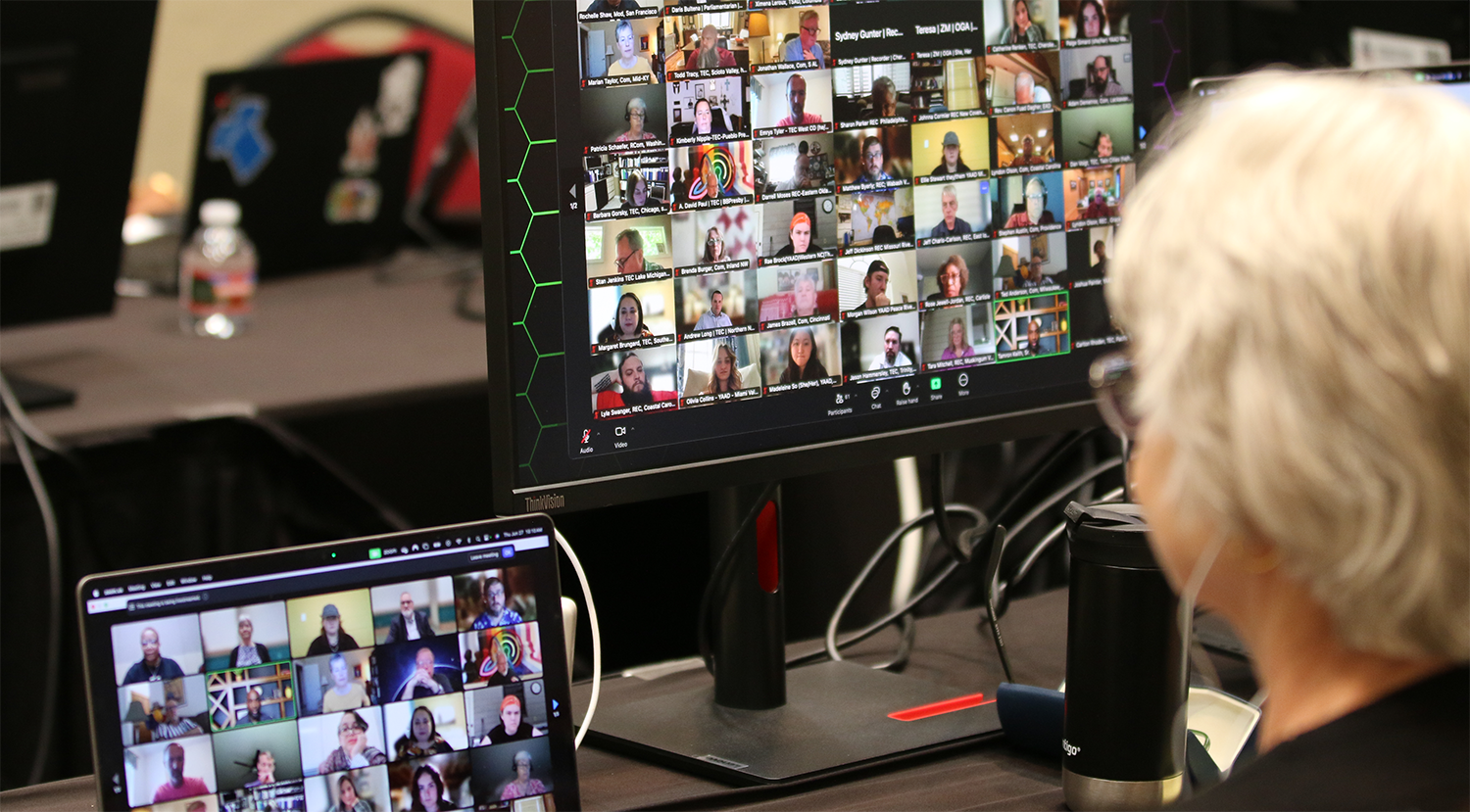
Committee assistant Sandra Hedrick participates in the meeting of the International Engagement committee on June 27, 2024. Photo by Randy Hobson.
The final business day for the International Engagement Committee kicked off with Moderator Rochelle Shaw prompting the worship team, led by Young Adult Advisory Delegate Ellie Stewart of the Presbytery of the Mid-South, and Theological Student Advisory Delegate Ximena Leroux of Columbia Theological Seminary, to open the meeting with prayer.
Despite passing INT-05, On Confessing our Complicity in Christian Zionism, on Wednesday by a large majority, it was brought up for reconsideration. Several commissioners did not feel heard during that session and had concerns over syntax and word choices in the approved version. Most of Thursday morning’s debate centered on the words “heretical views” and replacing them with “dangers” of Christian Zionism. Another motion recommended editing Item 3 and its reference to the Ten Commandments found in the Universal Declaration of Human Rights. Commissioners got bogged down with grammatical issues and wordsmithing preferences, which took up several amendment votes and most of the morning session.
In addition, an amendment was offered by Matthew Byerly, a ruling elder at the Presbytery of Wabash Valley, which called for the PC(USA) to commit to “clarifying in liturgy and through education a basic distinction between biblical Israel and the modern State of Israel, in order to avoid a conflation of the two, and to reduce such confusion as contributes to the harmful effects of those religious ideologies popularly known as Christian Zionism, distinct from historic Jewish Zionism.”
A resource manager noted that since the amendment did not specifically call for print materials, this could be accomplished via digital or electronic efforts without further financial implications. This amendment passed 38–6 and was added as point 4 to Item B (which calls for issuing a study document on Christian Zionism expansion since 2004) in the overture.
After several iterations and acknowledgement by one commissioner that “we’re getting stuck,” the INT-05 overture as amended passed 40–3 and will go to the General Assembly for consideration.
Finally, the day’s “scheduled” agenda began with consideration of INT-06, Educational Resources for Seeking Ways to End Israeli Apartheid, sponsored by the Presbytery of San Francisco. Its goal is to inform members, congregations, presbyteries and national staff of two key resources that can help PC(USA) members and partners understand Israeli apartheid within the construct of European colonialism.
Three overture advocates spoke to the committee on the item. Tom McAfee of the Presbytery of the Redwoods said, “We are witnessing a revolution of empathy … this is the perfect time for us to tell the true, complete story of Israel and Palestine to the world. Ultimately, we want to help others understand how the situation has evolved over decades.”
John Anderson, a teaching elder at the Presbytery of San Francisco, said, “These recommended resources can provide witness to the global significance of Palestine today and give voice to the reality of those who suffer there.”
The resources recommended are Why Palestine Matters: The Struggle to End Colonialism and Focus: Palestine, a three-part multimedia series developed by the World Communion of Reformed Churches.
Returning from lunch, the committee immediately considered a motion to amend that added language defining apartheid as not equal to what was found in South Africa but as defined by the United Nations International Convention on the Suppression and Punishment of the Crime of Apartheid of 1973 and the Rome Statute of the International Criminal Court of 1993. That was struck down, and a new amendment that noted “no singular apartheid defines ALL apartheid” was included, along with the definition from the 2022 General Assembly’s INT-02, On Recognition That Israel’s Laws, Policies, and Practices Constitute Apartheid Against the Palestinian People. This passed with a 39–5 vote; however, another amendment added back the legal definition from the first amendment into the overture and is the version that ultimately passed for full Assembly consideration by a vote of 40–3.
Margaret Brungard, a teaching elder at the Presbytery for Southern New Jersey, noted how important the additional language is for her congregants.
“I do think it is important to have this language, definition and background information from the previous General Assembly here in this document because, realistically, I don’t know how many congregants are going to read all the rationale, recommendations and comments. I know they’ll read the overture; so, it is important to give context.”
A Commissioners’ Resolution was added to the committee’s agenda on Wednesday, CR-05, On Reaching Out in Concern for the Presbyterian Reformed Church in Cuba and the People of Cuba.
Dennis Smith, a ruling elder with the Presbytery of the Cascades, presented the resolution to the committee, noting how devastating the state sponsor of terrorism designation affects the Cuban economy to the detriment of the Cuban people. The resolution calls on the church to:
- Urge agencies to find ways to respond to the economic crisis that afflicts the people of Cuba and our siblings in the Presbyterian Reformed Church in Cuba;
- Call on the Stated Clerk to declare a churchwide Sunday of Prayer for the Presbyterian Reformed Church in Cuba; and
- Urgently call on the U.S. government to remove Cuba from the list of state sponsors of terrorism (SSOT).
A couple of commissioners expressed concern over removing Cuba from the SSOT list without justification. One believed it fell outside the church’s purview of action. Catherine Gordon, the representative for International Issues with the Office of Public Witness in Washington, D.C., noted that current General Assembly policy calls for Cuba to be removed from the list. An amendment was brought forth to strike it from the resolution but failed. Therefore, the original resolution to recommend approval for full Assembly consideration passed by a vote of 42–3.
